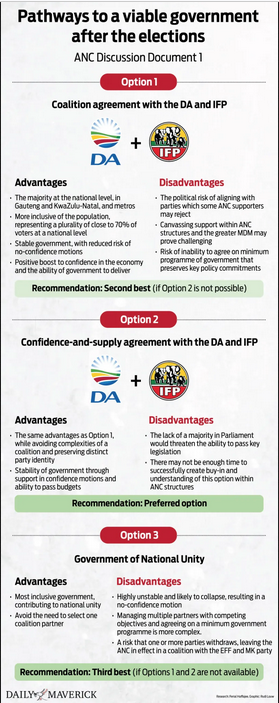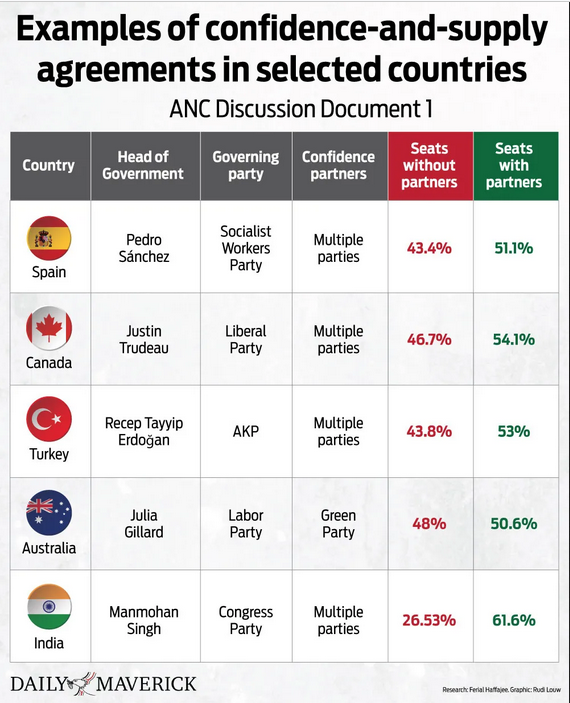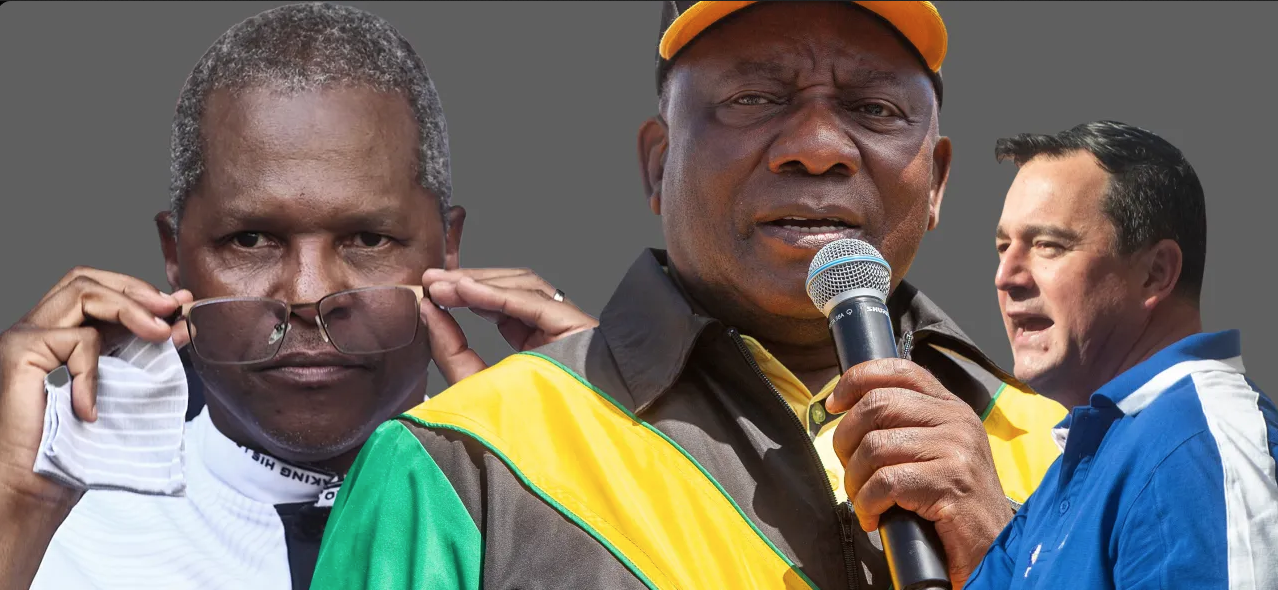A Canadian- and Turkish-style ‘confidence and supply’ agreement — where the ANC runs the executive and the DA and IFP (perhaps with the EFF) controls the legislature — is seemingly the most favoured option right now.
hree discussion documents obtained by Daily Maverick, and tabled as ANC NEC talks on power-sharing get under way in Johannesburg on Tuesday 4 June, show the party’s possible direction as it wrestles with the options before the 16 June deadline.
The party is leaning toward a so-called “confidence and supply” agreement, possibly with the DA and IFP as its preferred partners, but leaving the door open to other partners too.
Document 1 is written by a young, progressive intellectual in the ANC. It says: “A coalition agreement that impedes the renewal and transformation agenda of the ANC would be a marriage of convenience and would prioritise political expediency over the long-term effects on the ANC and the country as a whole.”
It argues that: “For these reasons, the ANC must exclude the Economic Freedom Fighters (EFF) and Jacob Zuma’s Party/uMkhonto Wesizwe Party (MKP) from potential coalition candidates. Such a coalition risks undoing the substantial progress achieved by the ANC government to date.”
This paper sets out the differences between the ANC on the one hand and the EFF and MK on the other.
This document says the best option for the country’s stability is an ANC-DA-IFP power-sharing agreement. It sets out three forms of power-sharing: a coalition government, a so-called “confidence and supply” agreement, and a government of national unity.
It rates the preferred option as a “confidence and supply agreement” in which the ANC holds executive power (perhaps with positions for the IFP). At the same time, the DA takes the legislature, including the Speaker and important committee positions.
The IFP is an attractive partner for the ANC because its leaders have a good rapport. This will enable both parties to start rebuilding in KwaZulu-Natal, where they have been decimated by MK. More defections are expected in the province.

A primer for party leaders, Document 2 defines this agreement as follows: “A supply and confidence agreement, like the one used in Canada, is a formal arrangement between political parties where [one] or more supporting parties agree to support the government in exchange for key votes in exchange for policy concessions or involvement in the legislative process. This type of agreement is particularly crucial in minority government situations where the ruling party does not hold an outright majority in the legislature.”
It makes the system workable, otherwise the state could cease to function. This is from the document which negotiators will use.
How is it formed?
The governing party (likely the ANC), which lacks a majority, negotiates with one or more other parties to gain their support. The goal is to ensure the government can survive critical votes in Parliament, particularly on Budget (supply) matters and significant legislation.
What happens in key votes?
The supporting party or parties (in this case, perhaps the DA and IFP) agree to vote with the government on important issues, primarily the Budget and any confidence motions. Confidence motions are critical because a lost confidence vote can force the government to resign, possibly leading to a new election.
What are the trade-offs?
In return for this support, the supporting parties typically negotiate for specific policy commitments from the government. These might involve legislative actions, budgetary allocations or changes to proposed laws that align with the supporting party’s agenda. For example, in Canada, the New Democrat Party required policy concessions from the Liberal Party minority government regarding the creation of a plan to enable low-income individuals to access dental care.
The agreement also spells out the duration and specific terms, including policies to be pursued and the conditions under which the parties might end the deal.
“This agreement can provide stability to a minority government by ensuring it has enough support to pass essential legislation and budgets. At the same time, it holds the government accountable to the supporting parties, reflecting a broader range of interests than the governing party alone might represent,” says Document 2.
It concludes that: “Supply and confidence agreements allow minority governments to function without formal coalitions, providing flexibility and ensuring that multiple political perspectives can influence government policy.”
The graphic shows that the confidence and supply model is used worldwide, and the ANC is looking at the Canadian and Turkish models in particular.

A senior ANC leader said the party would first establish those policies it cannot negotiate, which would be hard to crack. These include black economic empowerment (the DA’s manifesto pledges to scrap it); land restitution and expropriation (the DA is against expropriation without compensation, the ANC for it), and foreign policy (the ANC is pro-Palestine, the DA is not).
Other areas seem intractable and have made ANC chairperson Gwede Mantashe an early opponent of a deal with the DA.
The DA believes the minimum wage contributes to unemployment. The ANC’s view is that minimum wages have lifted millions of low-skilled black workers out of extreme poverty.
The ANC will develop its positions before holding talks with other parties.
There is an urgency here as only 13 calendar days remain to make a deal and form a government.
Document 3, titled “Scenarios for a coalition government”, was written by ANC member Matsobane Ledwaba, along with four experts. This nine-page document is well-circulated among ANC members and sets out various scenarios for power-sharing. It makes the critical point that the ANC is not a junior negotiating partner.
“With the election results now over, the ANC remains the largest party in South Africa, securing a vote of 40.22%.”
Ledwaba’s paper, in part, blames the outcome on “sponsored media” and the “moon-pack” parties (the moonshot pact or Multi-Party Charter, which has now been disbanded). It sets out five scenarios for ANC leaders to discuss.
The authors then weigh these scenarios against ANC policy priorities, voter share, previous work relationships and policy convergence, while ensuring a minimum of 51% in Parliament.
The document sets out criteria for the party leaders to make decisions on economic transformation, social transformation, growth, recapturing lost constituencies, defending democracy and freedoms won, the legacy and future of the ANC, and the stability of a coalition.
Then, the paper ranks the various coalition options. It places an ANC, EFF, PA coalition at #1, an ANC-EFF-IFP coalition at #2, and an ANC-MK-EFF coalition at #3.
In conclusion, it cautions ANC leaders to “pay close attention to the sponsored narrative by the media and funded organisations with (a) mandate to bring regime change. There is no easy coalition; each has its own dynamic advantages and disadvantages.”
The ANC leader who spoke to the Daily Maverick on condition of anonymity said it was essential for any power-sharing arrangement to deal with economic exclusion as this had fuelled MK’s success.
Economic freedom is also the critical organising campaign for the EFF. He said the ANC should consider adding the EFF to the model of an ANC-DA-IFP “confidence and supply” agreement that is gaining favour.
Stay informed with The Namibian – your source for credible journalism. Get in-depth reporting and opinions for
only N$85 a month. Invest in journalism, invest in democracy –
Subscribe Now!






